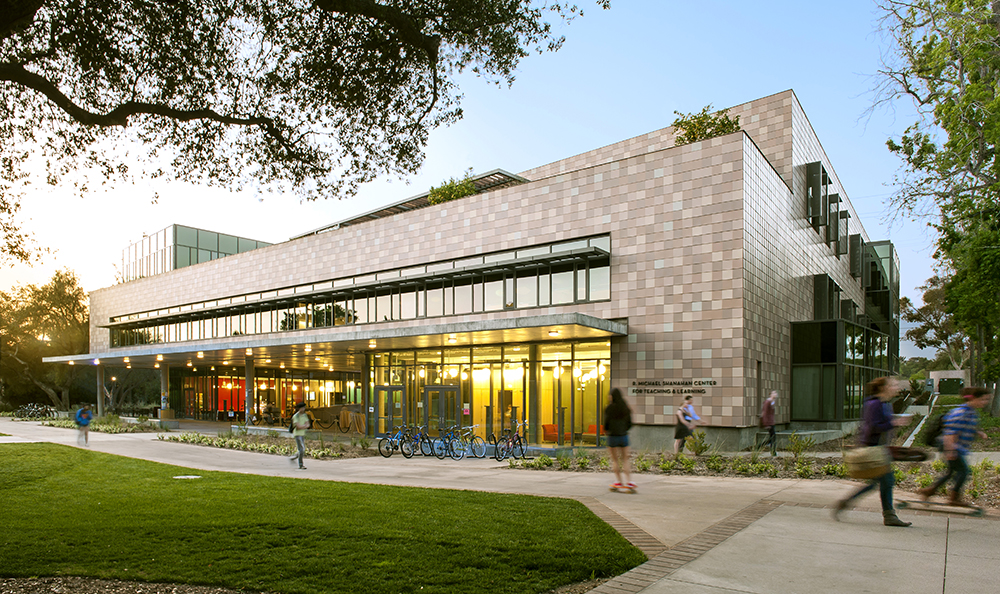Harvey Mudd Faculty Members Lead Dialogue on Social Justice
October 13, 2016
When the Karps’ adopted son was 3, he’d ride his bike in the street, and his parents had only the slightest cause for concern. Now he’s grown, living in Houston and driving. Mom and dad are concerned not only because he doesn’t have a driver’s license, but also because he’s African-American.
“Now, I have to worry about this being punishable by death. It’s mindboggling and ridiculous, and it’s the world we live in,” says Dagan Karp, associate professor of mathematics and associate dean of diversity.
Karp shared this personal story with more than 150 Harvey Mudd College community members gathered during a forum held at the beginning of the 2016–2017 academic year. Other faculty members, students and staff also described their own experiences as well as feelings about some of this past summer’s culturally divisive events. The gathering on campus was initiated by Harvey Mudd faculty members who are passionate about social justice, meaningful equity and inclusion on campus.
In addition to providing a venue to have respectful dialogue, the forum allowed time for participants to brainstorm concrete actions to make HMC more inclusive and welcoming and to promote greater social justice locally and beyond.
“We have the most important civil rights movement in the country in the last 50 years happening currently,” Karp says. “The struggle for gender, LGBTQ and racial justice is now an everyday part of the national conversation. We are part of and not separate from our larger society, and our institution plays an important role.”
Nearly one-third of Harvey Mudd faculty members, representing all academic departments, attended the fall community forum and helped lead the conversation about diversity, inclusion and equity in times of social injustice. It’s the first in a series of open dialogues and conversations planned for this year.
“This is one of the ways that Harvey Mudd is leading the way and carving a path for other liberal arts colleges,” says Sumun (Sumi) Pendakur, associate dean for institutional diversity. “Faculty have such a strong presence that the ability to leverage their power in this particular format is really meaningful.”
“As a student, it was empowering and comforting to hear faculty step out of their ‘classroom’ role and share their experiences,” says Harvey Mudd student government president Shailee Samar ’17. “It helped me realize that my emotions and responses were normal, and I had mentors who I could share my feelings with.”
She and other members of student government look forward to more forums and discussions with faculty to help all concerned cope with important events and participate in responses to them.
In light of recent decisions by some colleges and universities to take a stand against safe spaces on campus— environments that are welcoming and conducive to learning for all students regardless of aspects of their identity such as race, gender, sexuality, class and ability —Karp is excited by the prospect of HMC disproving the notion that these spaces are to be discouraged (Harvey Mudd considers its recently updated Office of Institutional Diversity as a safe space.). It’s another way for the College to lead, he says, in the same way that Harvey Mudd is known nationally for its academic successes.
“The more people who know that you can, in fact, have an inclusive environment, where you’re doing arguably the best undergraduate science, engineering and mathematics in the country, and doing so with a diverse student body, including people who are from historically underrepresented groups in science, the better,” Karp says. “I want it to be known that it’s happening here and that we’re not doing this to count numbers, that we’re broadening participation as a part of the civil rights struggle.”
Participants at the fall gathering provided several suggestions for improving equity, inclusion and social justice on campus. They included:
- Providing a “social justice” discussion table in the dining hall during meal times
- Inviting alumni to be part of the discussion
- Developing a mechanism for students to advise and support faculty members regarding social justice issues
- Helping students and faculty who are passionate about social justice pursue these interests
- Creating a work-study position in the Office of Institutional Diversity that would serve as a resource regarding current events relating to social justice and equity
“My dream is for people to know that Mudd is proof by example that one can play a leadership role in undergraduate STEM education while broadening participation in STEM and working passionately toward social justice on campus and beyond,” Karp says.
